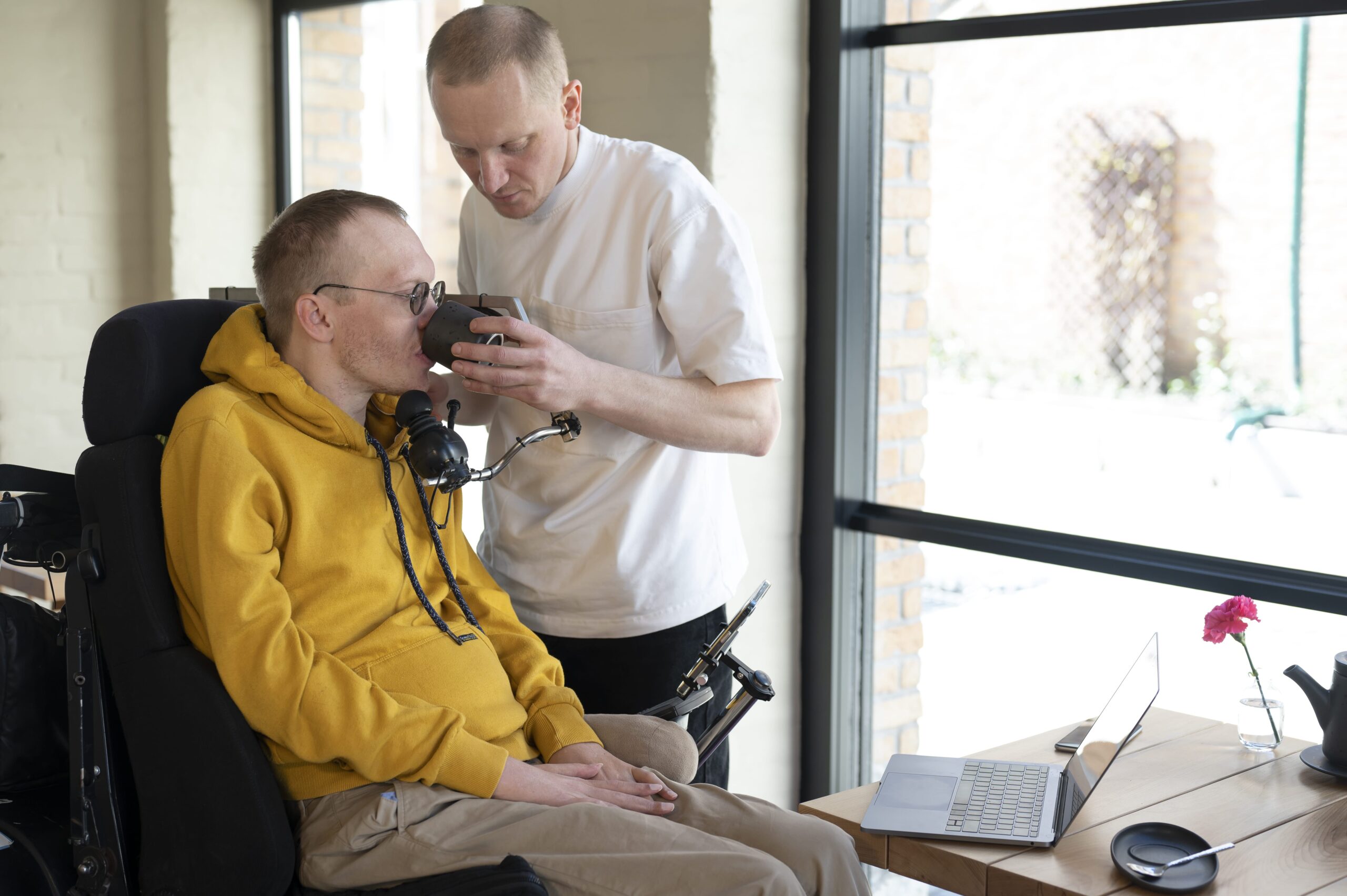NDIS provides financial assistance to people with disabilities so they can live independent lives with the help of the resources and support they need.
NDIS offers a wide range of support categories, each designed to meet the specific needs of people with disabilities. There are different types of NDIS support categories. Each support category has its own set of benefits, so it’s important to understand the differences before making your final decision.
In this article, we’ll take a closer look at each of the four main support categories and help you decide which one is right for you.
What Are the NDIS?
The NDIS, or National Disability Insurance Scheme, is a government-run program that provides support to Australians with disabilities. It’s the largest disability insurance scheme in the world.
There are three main types of NDIS support: support for daily activities, support for social and community participation, and support for economic and workforce participation. So what does each of these categories mean? Let’s take a closer look.
Supports and services delivered under the NDIS
NDIS funding is for reasonable and necessary support and services that help people with a disability achieve their goals.
The NDIS is not means-tested, which means that people with a disability can access the scheme regardless of their income or assets. The NDIS is needs-based, which means that people with a disability will receive funding based on their individual needs.
It is designed to provide people with a disability with the support and services they need to live an ordinary life.
The NDIS delivers a range of supports and services, including:
- Personal care and support
- Assistance with daily living
- Transport
- Home and community suppor
- Therapeutic supports
- Education and training
- Employment support
The NDIS is designed to provide people with a disability with the support and services they need to live an independent and inclusive life.
Different Types of NDIS Support Categories
The NDIS plan includes three categories:
Core Support Categories
The National Disability Insurance Scheme (NDIS) provides support for eligible participants to help them live an ordinary life. The type and amount of support are individualised, based on the person’s needs and goals.
NDIS core support is for basic daily living needs and helps participants to achieve their goals. It is funded by the Australian Government and is available to all eligible NDIS participants. In order for you to achieve your goals, Core Supports assists you with your daily activities, as well as your current disability-related needs.
Your NDIS plan may include funding for the core support budget. The NDIS core support budgets are as follows:
Navigate the NDIS Support Maze with Us
Embarking on the NDIS journey? We’re your compass. Reach out for expert guidance on the various NDIS support categories.
Consumables
Consumable products or services that aid in daily activities, such as interpreting, translating, continence, and home enteral nutrition services, fall under this category.
Assistance with community participation and social participation
This category allows participants to participate in social and community groups, such as camps, art classes, and other programmes that help the participant work towards development goals.
Supports and services for daily living
This category includes services and supports that assist you with daily activities, such as assistance with household decision-making, supervision within shared living arrangements, personal care and domestic help, and food services such as Meals on Wheels.
Transportation
This support category includes transportation-based supports and services such as specialised transportation to school or work, and also access to community events and other recreational activities and vocational training programmes.
Capital support categories
Capital Supports covers higher-priced assistive technology, equipment, and home modifications or vehicle modifications, as well as funding for one-time purchases (including Specialist Disability Accommodation i.e., sda). Capital support can be used for a wide range of items and adaptations, including wheelchair ramps, modifications to bathrooms and kitchens, and computer equipment. The amount of support available depends on the needs of the participant and the costs of the item or adaptation.
One of the supports available through the NDIS is capital support, which can help participants with the costs of major one-off purchases or adaptations to their homes. This NDIS support category is a vital part of the NDIS, as it helps people with disabilities to participate in the community and achieve their goals. Without it, many people with disabilities would not be able to access the same level of support and services.
The NDIS capital support budgets are as follows:
Home improvements:
This NDIS support category helps to cover the costs of making participants’ homes more liveable and accessible, such as installing stair climbers and guard rails.
Technology for the disabled (i.e. assistive technology):
This category of assistance helps to cover the costs of assistive technologies such as hearing aids and wheelchairs.
If you are a NDIS participant and you need help with the costs of a major purchase or adaptation, capital support may be able to help you.
Capacity building Categories
NDIS provides funding categories for a range of support that aim to build the capacity of people with disabilities so they can achieve their goals. These supports can include things like training, mentoring, financial assistance and more.
The NDIS is designed to help people with disabilities live independently, participate in the community and achieve their goals. By building capacity, the NDIS can help people with disabilities live the life they want to lead and have their own life choices.
Capacity building supports help participants develop the skills and knowledge that direct them to live an independent life. This can include things like learning how to cook, budget or use public transport. Capacity-building support can also help participants find and keep a job.
Capacity-building support can be provided by a range of different service providers, including disability support workers, community organisations, and private providers. If you are a NDIS participant, you can discuss your capacity-building needs with your NDIS planner or support coordinator.
Step into a World of Care, Contact Us Today!
Confused about NDIS support categories? Don’t be. Our experts are here to help! Contact us for a friendly discussion.
The NDIS budget categories for capacity building are as follows:
Increased social and community involvement
This category gives you access to a variety of community programmes, such as childcare, peer support, fitness groups, and respite care.
Better life choices
This support category seeks to empower participants to make wise life decisions. It includes a variety of services such as organisational, managerial, and financial skill development. It also develops their self-management skills, ability to direct support, and participation in NDIS plan management.
Better health and wellbeing
This category assists participants in improving their physical health by providing them with fitness, and different therapy services such as physiotherapy, early childhood intervention and dietary services.
Support that doesn’t come under NDIS
The NDIS will not cover any supports that are already provided by the government. This includes different funded support that is provided by state or territory governments, local governments, or private providers.
There are a number of support services available for people with disabilities that do not come under the NDIS. These services can provide much-needed help and assistance to those who need it and can make a big difference in the lives of people with disabilities. The support that doesn’t come under NDIS funding categories is as follows:
The NDIS will not allocate supports which already provided by the government.
The NDIS exists to provide services that other government agencies do not provide. When you have a disability, it can be difficult to determine who you need to contact in order to obtain funding and support. The NDIS works alongside many other government services, and there is some overlap.
The NDIS can help cover the cost of things like therapies, home modifications and personal care. However, the NDIS will not cover supports that are already provided by the government. This includes things like disability pensions, housing support and respite care. If you’re not sure whether support is covered by the NDIS, you can contact your local NDIS office for more information.
The NDIS will not cover the majority of day-to-day living expenses
The NDIS does not cover the majority of general day-to-day expenses. The NDIS does not cover items such as groceries, phone bills, event tickets, or general living expenses. People without disabilities buy these things with their own money, and the NDIS exists to bridge the gap between having a disability and not having a disability.
This is because the NDIS is designed to cover the additional costs that people with disability face. For example, someone with a disability may need to pay for extra transport costs or higher energy bills. The NDIS participant may receive funding that can help cover these costs, but it is not designed to cover the costs of living for people without disabilities.
The NDIS will not cover expenses that are not related to your disability
This one appears to be straightforward, but there is some technicality to it. Of course, if it is unrelated to your disability, the NDIS will not fund it.
Another way to put it is that the NDIS will not cover supports that are not related to your disability. This includes things like travel insurance, general health care, or home and contents insurance. While these things are important, they are not essential for living a safe and fulfilling life with a disability, and so they are not covered by the Scheme.
Benefits of Each NDIS Support Category
NDIS supports coordination is divided into three main categories: core supports, capacity building support, and capital support.
Each support category has a different purpose and provides different benefits to participants. Core support is essential for everyday life and includes things like personal care, accommodation, and transport. Capacity-building support helps participants develop new skills and independence, while capital support helps with the purchase of essential equipment and services.
Choosing the right support can make a big difference in your quality of life. It is important to take the time to understand the benefits of each support category so that you can choose the best support for your needs.
Master the Many Faces of NDIS Support
Have questions about the diverse NDIS support categories? We have answers! Connect with us and let’s make sense of it together.
Conclusion
In terms of improving people’s quality of life and daily living options, the NDIS has three different support categories for people with disabilities in Australia. This guide provides an overview of the various NDIS categories and the services they offer.
Please contact our support team if you have any other questions.
FAQs About the NDIS
Let’s take a look at some of the most common FAQs about the NDIS.
How Do I Choose the Right NDIS Support Category for Me?
You might be wondering how you go about choosing the right NDIS support category for you. It can be confusing but don’t worry, we’re here to guide you.
The first step is to identify your needs. What are you struggling with the most? Once you’ve identified that, you can start looking at the different support categories that are available. So take your time and have a look at each one to see which one is the best fit for you.
How to Access the NDIS?
So, how do you access the NDIS? The first step is to contact your local NDIA office. They’ll help you through the process and let you know what your next steps should be.
Generally, there are three ways to access the NDIS:
1) You can be referred by a health professional or another scheme participant
2) You can self-refer
3) Your service provider can refer you.
Once you’re registered, the NDIS will work with you to create an individual plan that meets your needs.


